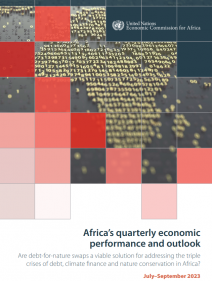Many African countries are among the world’s most vulnerable to changes in ecological and climatic conditions. Moreover, nearly all countries of the continent are currently heavily indebted. They are thus caught in a vicious cycle: debt servicing reduces the fiscal space available for investments in climate change adaptation and mitigation or to address environmental degradation. Debt-for-nature and climate swaps allow countries with valuable biodiversity to charge others for its protection and provision as a global public good. Therefore, they could attract new funds or stakeholders and even generate additional revenue for these countries. However, despite their great potential, debt-for-nature and climate swaps remain, for the moment, a niche instrument in the financial market. In the present report, the feasibility of implementing debt-for-nature and climate swaps in Africa is assessed, together with their potential to leverage additional finance for climate actions while also reducing debt burdens. Consideration is given to how African countries could take advantage of the growing interest among investors in these instruments that protect biodiversity and respond to the climate crisis. The report also contains recommendations on how to best realize the promise of debt-for-nature swaps.
Share this:
Are debt-for-nature swaps a viable solution for addressing the triple crises of debt, climate finance and nature conservation in Africa?
Release Date:
30 November, 2023
© United Nations Economic Commission for Africa

